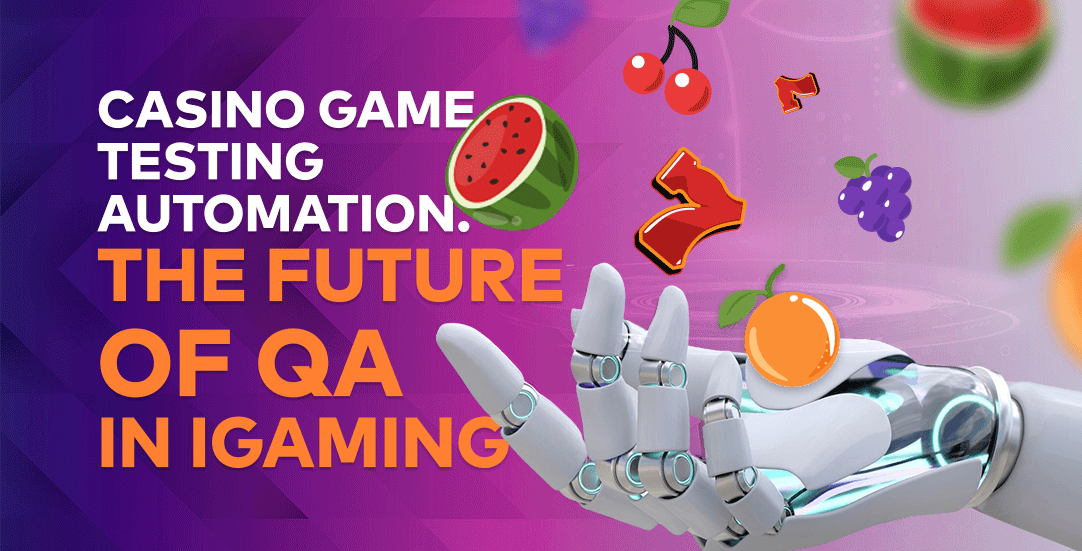Casino game test automation – The future of QA in iGaming

Today’s users, digital natives, born into a world where the internet was already an integral part of daily life, are much less patient than previous generations when it comes to digital products that don’t function intuitively and smoothly, as they expect. User standards are even higher in the world of online casinos, where players demand instant gratification and have even less tolerance for issues. If a casino interface isn’t easy to navigate, or if a game fails to load, takes too long, or contains gameplay bugs, users won’t just abandon the game, they’re likely to leave the entire casino.
The two most important factors that influence player acquisition and retention are directly related to games. Players come for the new titles and stay for their favorites. That’s why testing new games entering the casino, as well as regular health checks of games with the highest GGR potential, is so critical.
The challenge of maintaining full control over the technical health of games doesn’t lie in the complexity of the tests themselves. The real issue is volume. Smaller casinos typically offer around 500–1,000 slot games, medium-sized ones 1,000–3,000, while large platforms like Betsson may have 7,000 or more, with several new titles added every week. Understanding this scale highlights the challenges of QA in slot games and the need for automation and AI-powered solutions. Manual testing simply can’t keep up with the speed and volume of game launches, not to mention the diversity of platforms and devices.
By automating the testing of core game functionalities, casinos can reduce bounce rates, improve player acquisition and retention, and protect their gross gaming revenue (GGR). In the competitive iGaming industry, a single failed game launch can have serious financial consequences.
Top tools for automated game testing in 2025 – Key takeaways:
Automated testing isn’t yet a one-size-fits-all solution, but its use often reflects the quality of the products companies deliver. There are already a few tools making waves in the slot game testing space:
PlayPatrol
PlayPatrol is an AI-powered slot game health checker for casino operators, game providers, and studios. Using the power of AI, it automatically tests slot games daily across all platforms. It detects bugs before players do, spots gameplay issues that reduce GGR, and checks whether games meet technical licensing standards. PlayPatrol records the entire test session and uses AI to analyze the video footage.
Appium
Appium is an open-source tool ideal for testing mobile apps. In iGaming, it is widely used for automating test cases on Android and iOS platforms. It supports multiple programming languages (Java, Python, JavaScript) and integrates well with CI/CD pipelines.
Selenium
Selenium remains one of the most popular tools for automating web applications. Many HTML5-based casino games run in browsers, and Selenium is great for simulating user interactions like clicking, spinning, and betting. It’s especially useful for desktop web games but can also complement mobile testing when combined with Appium.
However, Selenium and Appium have a significant limitation when it comes to testing dynamic game elements like spinning reels. These are often rendered using canvas or WebGL, meaning their outcomes are not accessible via traditional HTML selectors. In such cases, visual testing tools like Percy come in handy. Percy enables visual validation by comparing screenshots taken after tests, helping verify whether key visual elements, like reel outcomes, appear as expected.
Still, visual testing has its limitations. Percy can’t cover every possible gameplay scenario, and its reliability heavily depends on the exact timing of the screenshot. If the image is captured just milliseconds too early, while the reels are still spinning or animations are running, it may result in a blurry or incomplete screenshot, making the test outcome unreliable.
This is where a new generation of test solutions like PlayPatrol comes into play. Instead of relying on static screenshots, PlayPatrol records the entire test session and uses AI to analyze the video. This allows for more comprehensive and accurate validation, even with complex animations and time-dependent interactions.
The success of automated testing depends on a well-planned strategy that uses the right tools and frameworks tailored to the game’s architecture and user base.
How automated testing can increase GGR and player retention
The connection between QA and revenue is often overlooked. In iGaming, every failed game session means lost bets and therefore, lost revenue. When we realize that the player base is evolving and new players value quality and immersive experiences above the size or legacy of a casino, we can see how testing and regular health checks of games become powerful tools in revenue growth strategies.
How automation and QA boost slot game GGR & retention
- Speed and coverage – automation enables fast, frequent testing across many devices and OS versions, ensuring consistent game performance. This allows product owners to quickly identify problems and act, whether by sharing a bug video with developers, removing a faulty game from top positions, or naturally redirecting players’ attention to other games until the issue is fixed.
- Reduced downtime – automated monitoring can instantly detect when a game fails to load or crashes, allowing developers to respond quickly and initiate fallback paths for users.
- Better UX means better retention – if games run smoothly, players are more likely to stay longer, play more, and return later.
- Faster release cycles – automation supports agile development and quicker go-to-market strategies, shortening the time from game creation to revenue generation.
By preventing bugs and ensuring reliability, automated QA protects the player base and provides oversight of every game in the portfolio. Slot game test automation plays a role at multiple stages of a game’s lifecycle: First at the game studio, then the aggregator, and finally at the online casino.
The future of QA in iGaming – AI, data, and more
There’s less and less room in iGaming for traditional scripted testing. Regression tests alone are no longer enough to stay competitive. Like every other industry, iGaming won’t escape technological transformation. Instead of resisting change, companies should adopt and integrate it. Below are some trends worth watching when building B2B or B2C solutions and responding to evolving user expectations:
- AI-driven testing – Machine learning can predict which parts of a game are most likely to fail based on historical data, helping testers focus on what matters most.
- Video-based QA instead of screenshots – AI enables detailed analysis of video modules and, combined with the right tech, can send recorded bugs directly to the appropriate teams.
- Predictive analytics – Combining player behavior data with test results helps identify which features should undergo stricter testing.
- Integration of TestOps and DevOps – QA is now a continuous process. Automation is integrated with CI/CD pipelines, enabling instant feedback loops during development.
- Cloud testing – Cloud-based environments let casinos test games at scale across thousands of real-world device and browser combinations.
QA is evolving, whether we like it or not. Clinging to outdated methods results in declining profits. Today, QA is not just about detecting bugs after they happen. When powered by AI, QA steps in earlier—acting as a risk minimizer and guardian of the user experience, supported by AI and big data.
How AI is transforming automated casino game testing
AI is reshaping the business space of casino game testing, shifting the focus from reactive to proactive quality assurance. Through smarter automation, advanced visual analysis, and more flexible testing, AI enables deeper, faster, and more efficient QA processes that ensure smoother player experiences and higher GGR.
Key QA-AI innovations revolutionizing the iGaming industry:
- AI-powered visual testing – AI tools like PlayPatrol can detect even the smallest visual inconsistencies, such as distorted graphics, misplaced buttons, or broken animations across various devices and resolutions. This is especially valuable for verifying dynamic elements like spinning reels, transitions, or visual effects that are hard to test with traditional tools like Selenium or Appium.
- Self-healing tests – AI-assisted frameworks can automatically adapt to UI changes like updated button IDs or altered screen layouts. Instead of failing due to changes, the system dynamically adjusts the test case, enabling continuous testing without manual intervention.
- Game bot simulations – AI bots can simulate thousands of real-world gameplay scenarios, testing randomness, edge cases, and performance under load. This ensures proper game behavior for both simple bets and complex multi-stage gameplay.
- Natural language test writing – AI tools allow testers to write test cases in plain English, which are then converted into executable code. This lowers the barrier for non-technical team members and speeds up test script creation.
- Video-based test analysis (e.g., PlayPatrol) – For interactive or animated content, tools like PlayPatrol offer breakthrough capabilities. Instead of relying on static screenshots, PlayPatrol records full test sessions including animations and interactions and analyzes the video using AI to validate test results. This approach is particularly useful for testing dynamic features like spinning reels, bonus animations, or transitions that require precise timing.
Well-implemented AI solutions ensure that even the smallest detail, whether it’s a delayed animation or an unexpected outcome, is detected, improving both test coverage and reliability.
Choosing the right casino game testing company
Selecting a trusted casino game testing company ensures compliance, security, and long-term success. Beyond certifications, today’s providers must offer automation and AI support to handle large portfolios efficiently.
Professional qa casino game testing services should include RNG verification, balance checks, security audits, and continuous monitoring. Solutions like PlayPatrol go further by simulating real player behavior: placing bets, verifying balances before and after spins, and recording video evidence for each test. This creates full transparency and builds confidence among operators and regulators.
A strong testing partner also needs to support bulk integration and scalability. Whether an operator has 10 or 1,000 games, tools should seamlessly go onboard to entire libraries and perform scheduled health checks automatically. By working with a company that combines industry expertise with advanced automation, casinos and studios gain both compliance and efficiency.
These innovations not only boost testing speed and accuracy but also reduce the burden on QA teams, enabling faster, more frequent releases. Thanks to AI, the testing process becomes more robust and efficient, ensuring that casino games are both reliable and engaging for players.





















